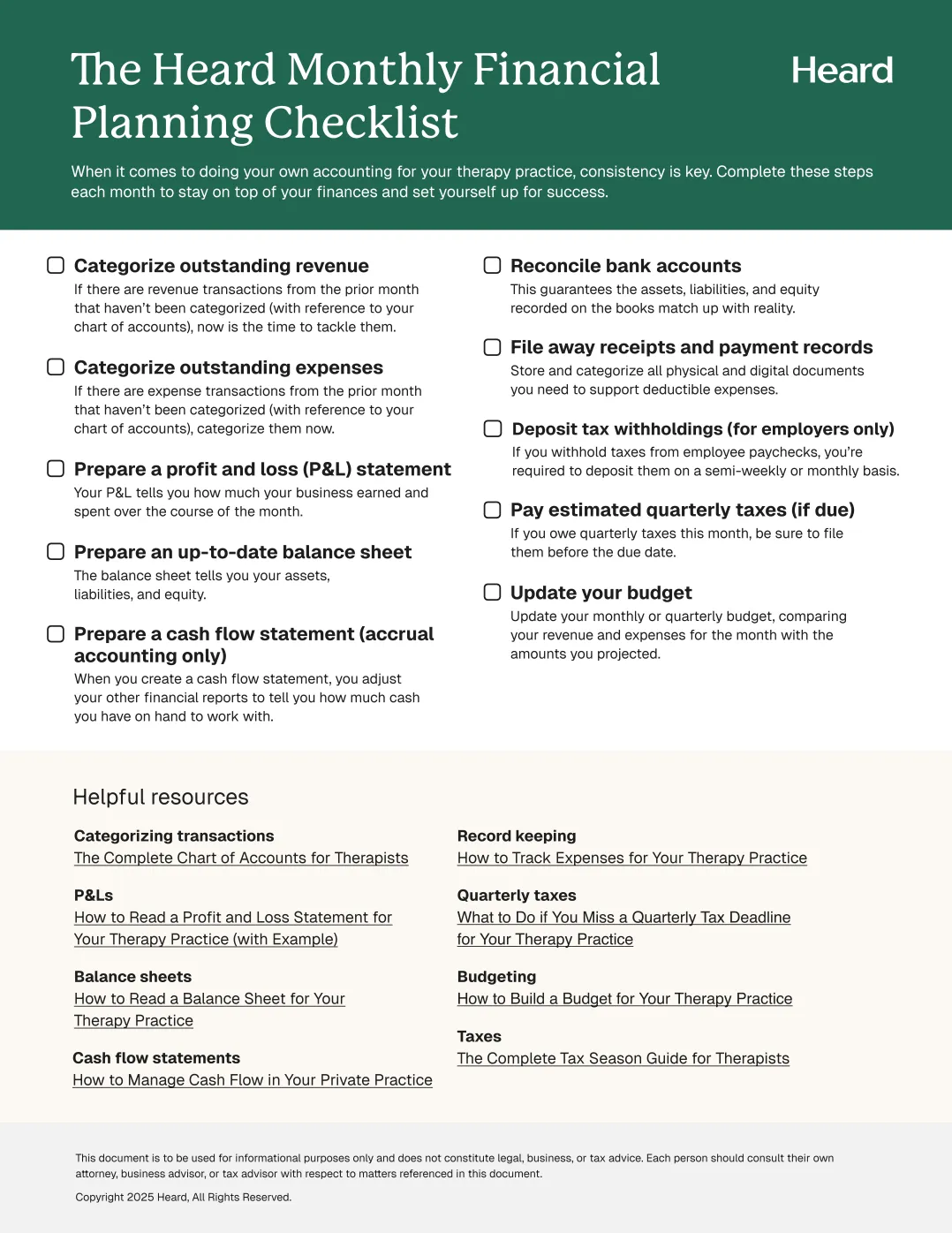“You don’t become a therapist to make money.”
Sound familiar?
If you’re like most of the therapists I know, you’ve heard some version of this during your career. Depending on your unique circumstances, these messages may or may not have impacted your relationship with money.
How would you describe your relationship with money?
Try this. Money is (fill in the blank).
If you said “stressful”, “complicated,” or “confusing,” then you’re not alone. There are some common themes that come up for therapists around money that are often rooted in scarcity, shame, and fear.
The truth is, the relationship you have with money—your thoughts, feelings, beliefs, and behaviors around it—will impact how you show up as a therapist and how you make decisions as a business owner.
I get it. As a financial therapist who's also a recovering people-pleaser and perfectionist, I learned early on to stay small and not ask for too much, especially when it came to money.
If you tend to avoid conversations about money, feel resentful toward a client because of how much money they have, or don’t charge cancellation fees out of guilt, your relationship could probably use some work.
Cultivating a healthier relationship with money that is not based in scarcity, shame, or fear starts with a greater understanding of where this relationship came from and how it continues to be reinforced by the larger systems in which you live.
{{resource}}
What is your money story?
One way to explore your relationship with money is to write out your money story or money narrative. This is the story of your life as it relates to money.
Starting with your first memory of money, take some time to reflect back on your interactions with money during childhood, adolescence, early adulthood, and adulthood, including specific events related to money that were particularly positive or negative.
Once you have your narrative written, you can start looking for themes and making some connections to your current thoughts, feelings, beliefs, and behaviors with money.
Here are some questions to help guide you through this process.
Childhood and adolescence
- What is your first memory of money?
- Did your caregivers talk about money? Were they stressed or calm?
- What do you think your caregivers learned from their parents about money?
- What was your socioeconomic status in middle school? How did you know?
- What was your first job and how much did you get paid?
Young adulthood and adulthood
- What did your transition to adulthood look like financially?
- Did you have financial support or did you have to provide for yourself financially?
- Were your educational costs paid for or did you have to take out loans?
- What was your first job as a therapist and how much were you paid?
- What messages have you received about money as it relates to therapists?
- If applicable, how have relationships with partners and/or children impacted your finances?
Take some time as you are writing to notice what emotions are present and any sensations that come up in your body and make note of them. Remember to take care of yourself through this process with a sip of water or a break if you get overwhelmed.
{{resource}}
What does money represent to you?
Money often holds a deeper meaning for people such as security, freedom, love or worthiness. One way to explore what money represents to you is by writing a letter to money as if it were a person, an exercise I learned in Trauma of Money.
You start the letter with, “Dear, Money,” and write freely for 10 minutes. Notice what thoughts, emotions, and body sensations come up as you are writing. Read back over your letter and see what you notice. This will give you some greater insight into what money represents for you.
Money and trauma
Another important factor to consider as you are developing a better understanding of your relationship with money is to explore the potential impact of trauma. This could be a specific situation or event directly involving money or an individual or collective trauma that is not directly related to money but is showing up in the way you relate to money.
Some examples of direct money trauma include growing up in poverty, divorce, loss of income, or experiencing financial discrimination. Money trauma can also extend to any form of trauma that has created a fight, flight, freeze, or fawn response which is now impacting how your body responds to money.
Some of the money behaviors you might notice if trauma is impacting your relationship with money include undercharging, underearning, overspending, hoarding money, and overworking.
Money in context
If there is one overarching way of thinking I learned from becoming a Marriage and Family Therapist it is that “all behavior makes sense in context.” There is always a reason why we think, feel, and act the way we do and this extends to our relationship with money.
Even seemingly illogical financial decisions begin to make sense when we understand the context of the person making them. Now that you are starting to get some clarity around your thoughts, feelings and beliefs about money, it is important to put them in context. In order to do that, we look at the systems that have created and continue to reinforce your relationship with money.
Our money culture tends to look at finances as an individual issue. From this perspective, if you are doing well financially, that is because of your own hard work, intellect, and discipline. If you are not doing well financially, it is your own fault for not working hard enough, making smarter decisions and not having enough discipline.
As you will see, there are many systems impacting how we relate to money. I’m going to challenge you to expand your focus to include the relational, community, and societal systems you have lived within and consider the impact they have had, and continue to have, on you and your relationship with money.

As you look at the diagram above, think about your own individual intersecting identities, the systems of oppression that have caused and continue to cause money trauma and the messages you may have internalized as a result.
Please note, these are just some examples and not an exhaustive list of individual, relational, community, and systemic factors.
{{resource}}
Talking about money with clients
Now that you have a better understanding of your relationship with money, you can see how it might show up for you when talking to clients about money.
You might also consider the relationship with money your client is bringing into these conversations as well. Here are some tips for talking to clients about money.
Here are some tips for talking to clients about money.
Setting your fees and raising your rates
Internalized messages about money tend to show up for therapists when it comes to making decisions as a business owner including setting and raising their rates.
Here is a helpful article on setting and raising your rates in a sustainable way.
As you can see, there are many factors that contribute to your money story and the complex and unique relationship you have with money. There are also similarities in what money represents to each of us.
When we can see our relationship with money in the context of the larger systems in which we all live, we can take less responsibility for the shame and fear we feel around money and begin to move toward healing.
—
This post is to be used for informational purposes only and does not constitute legal, business, or tax advice. Each person should consult their own attorney, business advisor, or tax advisor with respect to matters referenced in this post.
As the first woman-identified Financial Therapist in the state of North Carolina, Jillian Knight, LMFT specializes in helping women and couples improve their relationship with money. Check out her website to learn more.
{{cta}}
Manage your bookkeeping, taxes, and payroll—all in one place.

Discover more. Get our newsletter.
Get free articles, guides, and tools developed by our experts to help you understand and manage your private practice finances.





.webp)